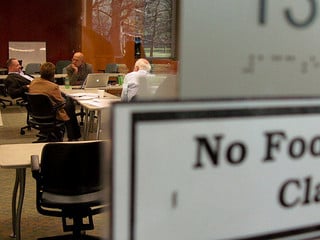You have /5 articles left.
Sign up for a free account or log in.
 Andrea Zellner is a PhD student in the Ed Psych/Ed Tech Program at Michigan State University and a permanent author at GradHacker. You can follow her on twitter at @AndreaZellner.
Andrea Zellner is a PhD student in the Ed Psych/Ed Tech Program at Michigan State University and a permanent author at GradHacker. You can follow her on twitter at @AndreaZellner.
In my program, we have two major milestones prior to the dissertation process. These tasks require that we conduct original research that we must orally defend in front of a faculty committee. I just successfully came through those milestones (woot! bring on the diss!) and thought I would share the collective wisdom that was graciously shared with me as I prepared for my defenses.
- Know it like your phone number. If you are presenting your research, you are presenting new knowledge. That means you'll have to have a good handle on all the previous knowledge that led up to your discovery. It's easy to get tangled up in the concepts, names, and factoids you'll need at the ready. I found it was easy to think of these things while wearing my comfy writing pants curled up on the couch, and a lot harder when facing down the sternest member of my committee. I used flashcards. I tried to anticipate what the committee would ask and practiced my answers aloud in the car, while doing the dishes, in the shower, and in line at the grocery store. This helped give me confidence and I believe increased my likelihood of actually remembering the things I knew when it came for my defense.
- Realize what might be confusing to people who aren't you. This is the thing I struggle with most. It's all so clear in my head, especially after spending weeks, months, or years with an idea or concept. Nonetheless, there are assumptions that we sometimes don't realize we've made that can confuse our readers and/or listeners. Find a person outside your field, preferably not an academic, and try it out on him or her. If they understand it, you've got it. If not, there's more work to be done.
- Expect technology to be involved and expect it to fail. For my comps defense, my advisor had to be Skyped in. I did this on the same machine that was running my presentation. I had nightmares that something would go wrong and showed up insanely early to pace outside the room (which had a class in it, of course) until defense time , clicking through all the tech issues I might have to troubleshoot. In the end, nothing went wrong, but I was prepared to give the presentation without my slides and ready to use my cell phone as a backup to Skype. More and more issues require members of committees to attend virtually. And almost all presentations have accompanying slides these days. Just make sure that you can carry on without the slides, too.
- There are only three acceptable answers to questions. This advice was passed on to me from Dr. Cary Roseth, who tells it to all of his advisees (and anyone else nearby defending something, which is how I heard it). The three acceptable answers are as follows: "The research says," "The theory says," or "I don't know, but..." and then you cite someone else. I realize that this advice is probably somewhat discipline specific, but I can imagine that avoiding saying "I think" with no basis in the literature is good advice for most.
- Put your rockstar jacket on. Why yes, I did just quote sage advice from the hit Nick Jr. show/band The Fresh Beat Band (the song "We're Unstoppable" got me through my comprehensive exam process). Even though I am very outgoing and seemingly without pride or shame (I once recorded a video for my online course with lipstick all over my teeth to drive home a point about peer feedback), I get quite nervous before presentations. It's just that they are so stiff and formal, with all kinds of rules etiquette I'm sure I will violate. I've found that the only way I can overcome this is by pretending to be someone else. I imagine that I am someone more accomplished, more confident, and generally more of a rockstar than I am, and just do what she would do. It's the only thing I've found that consistently gets me through my performance anxiety.
I'm still pretty wet behind the ears and I imagine I will update this list as I take on the dissertation phase of my graduate student life. I'm hoping to take these lessons and make myself a better defender of my own work. I also have the completely selfish hope that our Gradhacker readers will chime in with more advice that I can take with me into dissertation-land.
What lessons have you learned through the process of defending your work? Share them in the comments!
[Image by Flickr user 46137 and used under the Creative Commons license.]




